The concept
The idea was first floated back in 2017 when Cumbria Learning and Improvement Collaborative (CLIC), Library Services and the Head of Nursing talked about the need for a place close to the wards where staff could go for training courses and which they could use for their learning and development.
This eventually led to a project to create a learning and improvement hub - using an alcove in the staff restaurant - at the Cumberland Infirmary, Carlisle. This would give the library, Learning and Development, and Improvement teams a presence in the hospital. From our point of view this would also add to our growing network of learning spaces. The hub would also offer an opportunity for the service to support improvement and organisational-development (OD) initiatives and work together more with our trainers and staff. The aim was to create a flexible learning space to host small workshops and drop-in sessions and allow staff to access PCs for research and eLearning, thereby helping to develop and support a stronger learning culture across the organisation.
The consultation
We consulted with a wide variety of staff and stakeholders to get their views and find out what they wanted from the hub. We got almost 200 responses with the overwhelming majority supporting the idea. Using the Plan, Do, Study, Act (PDSA) model CLIC & Trust trainers also tried out the space running Rapid Improvement Workshops (RPIWs) with clinical teams with just temporary partitioning.
Trainers, clinical and non-clinical staff all responded. One of the most important things people told us was that they wanted the hub to be in the hospital and accessible to all staff.
The consultation used a variety of methods including:
- An online survey
- Face to face
- Trust news
- Print copies of the survey available in the library
- An evidence-gathering event in the CLIC canteen
- Ward walking
- Stakeholder-group meetings
- Targeted emails
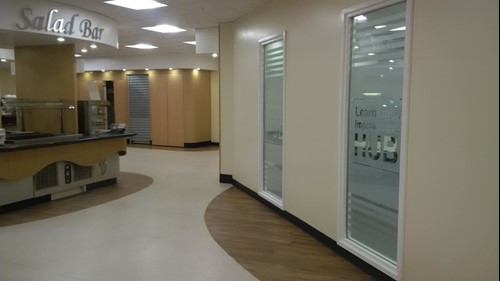
The need
When we asked staff and trainers about the barriers to learning we found that:
• Staff were often too busy and had very little time to access the library and training facilities which were some distance away from the wards and hospital
• Staff found it difficult to access PCs and find a ‘space to learn’ in their own work area.
• There was an acute shortage of training rooms and facilities at the Cumberland Infirmary site in Carlisle
• There was a strong desire from CLIC, Trust trainers and librarians, to increase their visibility across the hospital and improve their engagement with staff
The Benefits
Developing the Learning and Improvement Hub close to the clinical area has the potential to save staff time, as well as increasing the time - and improving the quality and opportunities -they have to learn and develop. In turn the expectation is that this will help improve staff morale and contribute to the Trust’s efforts to be a ‘Great place to work’ and, in the long term, result in the development of a stronger learning culture. West and Dawson have shown that this can result in improved patient care and outcomes.
Other benefits include:
• Helping meet the need for additional learning / training facilities of the current & future workforce
• Better use of the space in the staff restaurant.
• Supporting greater sharing and inter-professional learning.
• Greater visibility and presence for Library, Learning & Development, CLIC and the Improvement team within the hospital.
• Increasing visibility and transparency with public and patients.
The Bid
After the consultation we made a successful bid to Health Education England North’s Library Development Fund. Anna Stabler – the Deputy Director of Nursing, Midwifery & AHP’s at the time - agreed to sponsor our project. We submitted it and it was accepted on to the Trust’s and CLIC’s Engaging for Improvement programme (E4I) in 2018.
The risks and challenges
These included:
• Finding a vacant space and getting approval to use it
• The expense of converting the area.
• Complexity of PFI hospital and the need to work through the approval processes.
• Ownership and management of the hub as it is a separate area some distance from the library.
• Ensuring appropriate usage, i.e. for learning and research, rather than for meetings.
The process and methodology
The success of any improvement project lies in the engagement and involvement of the right people from the start. The Engaging for Improvement programme focuses on identifying an idea for change, making sure that the right information is gathered to understand and support your change and then helping you to engage with your own team and wider stakeholders. Your sponsor is vital to the success of your scheme and helped us overcome some of these risks and barriers we met along the way.
The E4I approach is a six-step approach designed to be worked through over 20 weeks. However the principles apply equally to smaller- or larger-scale projects that will take less or more than the recommended time. The development of the Learning and Improvement Hub took over two years from the initial idea to its completion.
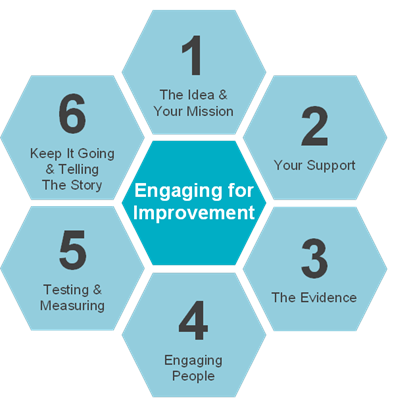
The E4I programme has been developed by the Trust and CLIC from the experience of similar improvement programmes, such as, Listening into Action and the continuing development and spread of CLIC’s Cumbria Production System. This brings together tried and tested tools that are part of CLIC’s improvement and transformational model.
The project used continuous improvement tools, such as, driver diagrams and project templates, (i.e. A3 plans, highlight reports, project summaries, mission templates, stakeholder mapping, etc.) and helped guide us when we organised a stakeholder engagement event. We surveyed staff and trainers gathering both quantitative and qualitative information.
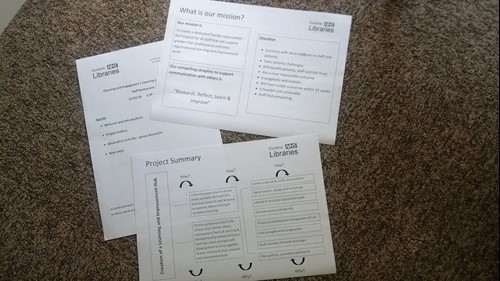
The Stakeholders
• PFI HMC and Interserve their service provider
• Trust Estates
• Finance
• IT
• Trust Communications Team
• Trust Senior Management Team
• Designers /Suppliers
• Learning and Development (L&D) team
• Clinical staff representatives
• CLIC Improvement Team
• Engaging with Improvement Programme lead and facilitator
• Knowledge Support Librarians and other Library staff
Outline plan and milestones
Key milestones included:
• Engage with stakeholders and get approval to go ahead (i.e. PFI, Trust Finance and senior management team)
• Submit project proposal for the first wave of the Trust’s Engaging with Improvement Programme.
• Look at design options and costs.
• Identify other costs with service provider related to change of usage (i.e. security, ventilation, health & safety, etc.) and follow process for submission of minor works.
• Agree and follow a programme of work.
• Launch with all stakeholders.
• Continue to promote, evaluate and improve.
Opening and Launch
In the lead-up to the official launch on the 1st November 2019 we set-up an Outlook calendar for staff to view the Hub’s availability and make bookings. The month before the launch we held induction sessions with the trainers showing them how to use the IT facilities and introduced them to the final version of the Hub’s standard operating procedure - which they helped us put together - about the day-to-day running of the Hub.
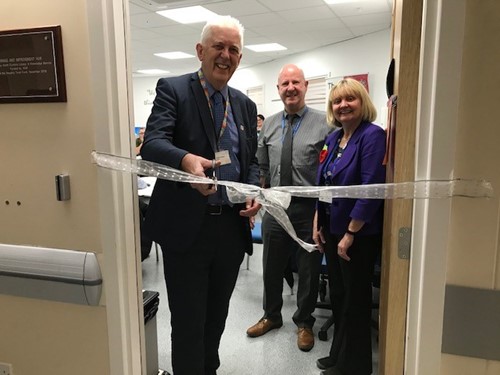
What have staff and trainers said so far?
The Learning Hub is fantastic ... so great to see all the plans come together
Love the bright environment ... it is so conducive to learning
Excellent space! Efficient, clean and welcoming. Well done!
Reflections and lessons learnt
It is still early days, however it certainly feels like the Library Service has increased its profile and the Hub has demonstrated just how serious we are about supporting the personal development of staff and the wider organisation’s quest to become a learning organisation. It has also offered many learning opportunities for us. We have all become more familiar with using and applying the Cumbria Production improvement tools and developed much closer working relationships with CLIC and the other trainers. We are now in the evaluation phase, so will see if usage and feedback reflects this.
One of the most important lessons we learnt was to spend as much time as possible consulting and engaging with staff and stakeholders to gather evidence. It's also really important not to rush ahead with the project.
We also discovered that developing a learning facility in a clinical area is entirely different from developing one in your library or another non-clinical area. Decisions about security and access, infection control, cleaning and life-cycle all need to be agreed beforehand.
Starting the consultation as soon as possible, as well as continuing to engage with staff and stakeholders throughout the project so they are kept on board and up to date, is absolutely essential.
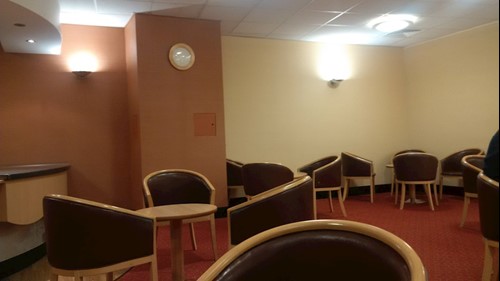
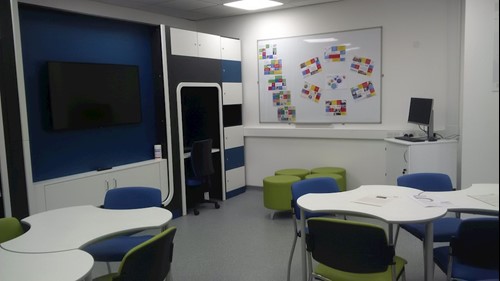
The Hub before and after its redevelopment
Acknowledgement
We would like to acknowledge Health Care Libraries North, Health Education England and Doughty Charitable Trust fund of Consultants at the Cumberland Infirmary, Carlisle for funding this project.
Sheila Marsh, Head of Learning & Improvement
North Cumbria Library & Knowledge Services

